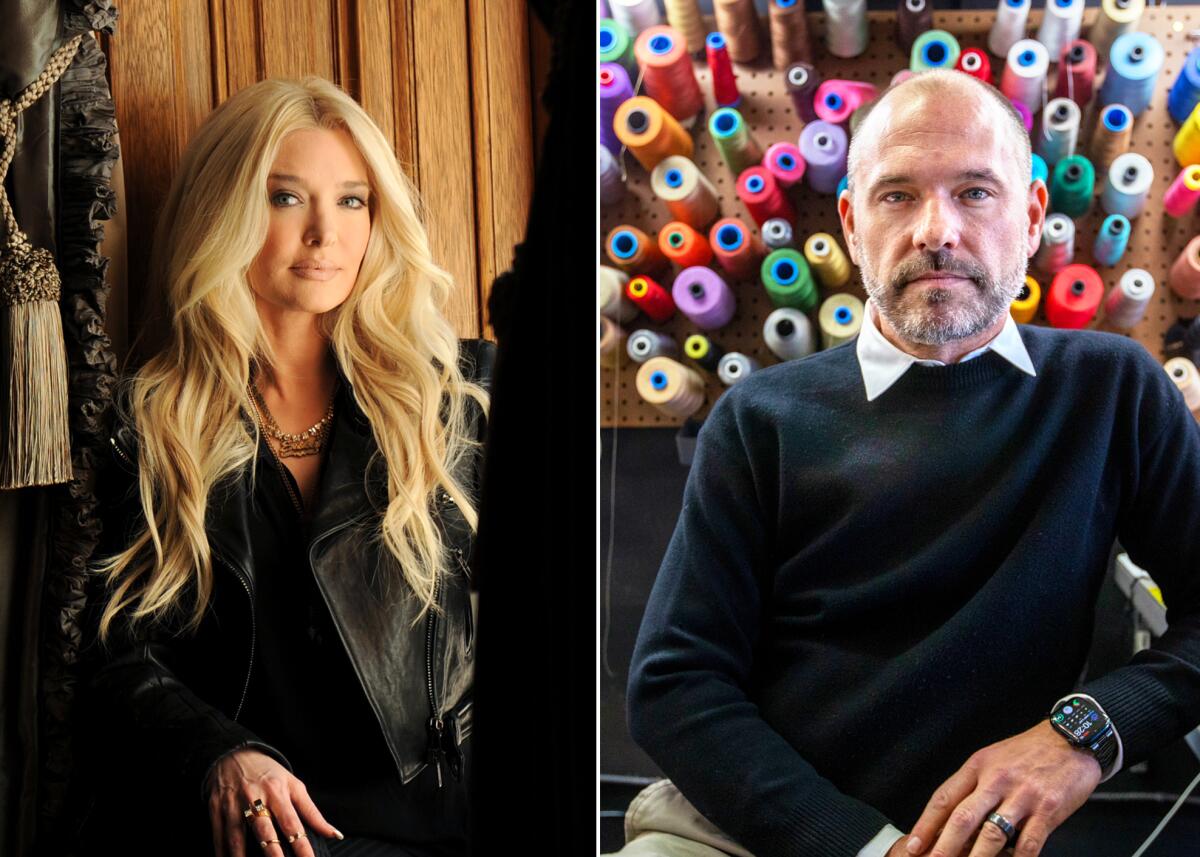Erika Girardi, Secret Service and American Express engaged in corrupt conspiracy, lawsuit claims

The co-owner of a Hollywood costume firm filed a lawsuit Tuesday against reality TV star Erika Girardi, two of her staff members, current and former U.S. Secret Service agents and American Express, alleging corruption among federal law enforcement to benefit Girardi and her once-influential husband, former Los Angeles attorney Tom Girardi.
In the 70-page suit, Christopher Psaila accuses Erika Girardi and her estranged husband of having “weaponized the Secret Service to maliciously prosecute” him in 2017 to secure a $787,000 refund from American Express at a time when the Girardi family was “in desperate financial straits.”
Chris Psaila, co-owner of Marco Marco design firm, said false accusations by Erika Girardi nearly sent him to prison.
Psaila is the co-owner of costume merchant Marco Marco, which has designed outfits for a variety of pop stars. He alleged that Erika Girardi, along with her assistant and choreographer, knew she had purchased and received scores of costumes and services from the firm in 2015 and 2016. But they falsely claimed to federal agents and to American Express that the store’s charges to her credit card were unauthorized, according to the suit.
Pasaila also contends that the Secret Service conducted a “reckless investigation” into Erika Girardi’s claims and “deliberately ignored” facts that would help exonerate him. In the suit, he alleges that current and former Secret Service agents concealed evidence that would have either prevented his indictment or led to an acquittal at trial.
The case draws on an investigation by The Times published in February that documented Girardi’s friendship with the head of the Secret Service’s office in L.A., Rob Savage, and the free legal work that Girardi provided Savage.
The Times reported how Girardi began representing Savage in a pending lawsuit against Volkswagen over a defect in his minivan. When Girardi could not secure a better settlement and his efforts fizzled, he personally paid Savage at least $7,500. At the time, agents under Savage were investigating Psaila.
Savage is one of the three current or former Secret Service officials named as defendants in the lawsuit, which casts Girardi’s legal work as a “bribe and quid pro quo” to Savage.

“This case reflects the corruption of the federal judicial system,” Psaila’s lawsuit states. “The Secret Service and United States should have never presented the case to the grand jury for indictment, and never proceeded with the prosecution.”
A spokesperson for the Secret Service declined to answer questions, citing a policy of not commenting on pending litigation.
Evan Borges, an attorney representing Erika Girardi, dismissed the lawsuit as a ploy timed with his client’s new Las Vegas residency and suggested the evidence of corruption was thin: “Tom Girardi’s representation of a single federal agent in an unrelated civil lawsuit.”
“Federal prosecutors made the decision to charge plaintiff with crimes, no one else,” Borges said. “The notion that Erika controlled the U.S. Government, or for that matter a Fortune 100 company such as American Express, is fantasy.”
Erika Girardi told The Times earlier this year that she remained convinced that Psaila had falsely billed her for hundreds of thousands of dollars.
“In no way did I pull a scam to get $760,000 to help anybody get this money,” she said earlier this year. Erika Girardi noted that as part of the criminal investigation, she had worn a wire and conducted an undercover recording of Psaila.
On the recording, Erika Girardi is joined by her assistant and her choreographer in a meeting at Psaila’s office. Confronted with accusations of false charges, Psaila acknowledged “excess billing” of “just over $100,000” that he blamed on a bookkeeper who he said, falsely, had been responsible for running the cards, according to a copy of the recording reviewed by The Times.
In the lawsuit Tuesday, Psaila’s attorneys allege that the covert recording was an entrapment attempt and insist that the audio “reveals nothing more than an innocent merchant attempting to follow a well-known rule of retail business: ‘The customer is always right.’”
A spokesperson for American Express told The Times that the company did not initiate the criminal probe of Psaila, adding, “We followed our regular processes and procedures throughout this investigation as we dealt with law enforcement. ... We did not play any role in the criminal investigation of Mr. Psaila or his business other than responding to inquiries from law enforcement.”
Savage, who retired in 2018, did not respond to a request for comment on the suit. He previously denied any exchange of favors, saying via email that the credit card inquiry and his minivan case with Tom Girardi were “completely unrelated.” Savage said he had maintained a friendship with the former lawyer, saying he “occasionally dined with Mr. Girardi always as a friend and within ethics guidelines.”
Savage said in the earlier email that he introduced Erika Girardi to one of his deputies so she could report fraudulent credit card charges, but he said the deputy “managed the investigation without any involvement from me.” He asserted he was not “directly” involved in the indictment.
At the time, Savage also acknowledged that that deputy and other agents on the case did not know he had hired Girardi for a personal legal matter, nor did he inform his supervisors about it.
Psaila was indicted on nine counts in 2017, including wire fraud and aggravated identity theft. But he insisted on his innocence and put together a dossier of text messages, receipts and photos that he said substantiated the charges on the Girardis’ American Express card.
In 2021, federal prosecutors quietly moved to dismiss the case against him.
The lawsuit filed Tuesday includes two dozen pages of photos, text messages, and billing records that Psaila said prove “beyond all doubt” that he and Marco Marco provided the costumes and services that the indictment claimed were phony or unauthorized. Psaila’s suit asserts that he has similar proof for all of the transactions that were the basis of the refund issued to the Girardis by American Express.
Psaila’s suit notes that American Express only reversed the charge on one transaction — for $4,500 — and that to this day, Marco Marco and Psaila are free to use American Express at their business.
The lawsuit seeks $18.2 million in general damages along with unspecified punitive damages. Psaila also filed a separate claim Tuesday against the Secret Service for $75 million.
More to Read
Sign up for Essential California
The most important California stories and recommendations in your inbox every morning.
You may occasionally receive promotional content from the Los Angeles Times.












